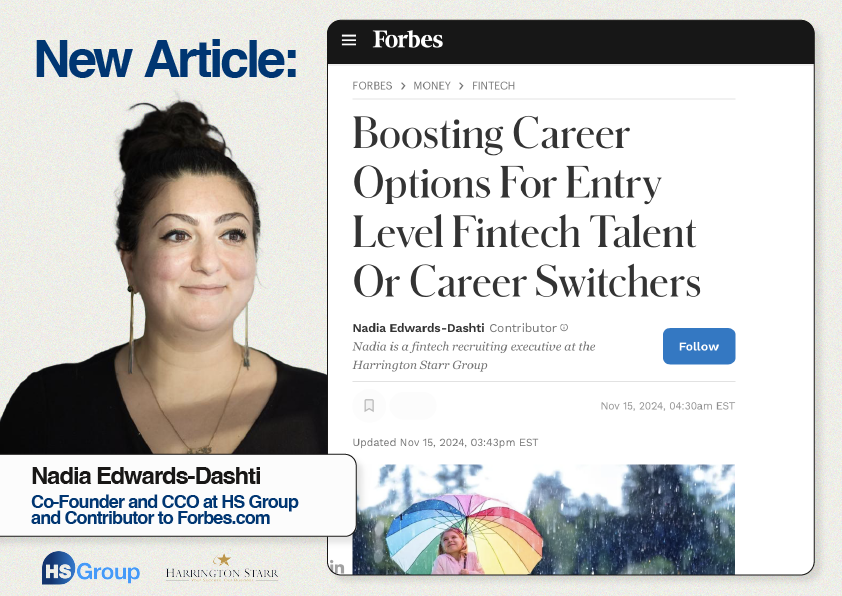
Did anyone ever tell you growing up that you’d make a great doctor, inspiring teacher, or even the next rising poet? How often have you heard someone tell a teenager, “You’d be great in fintech?” It’s a conversation that doesn’t often come up even though the skills and qualities needed to thrive in fintech are what many people already have.
2025 is projected to be the biggest year for career pivots. Fintech is stabilizing and opening new roles for people with fresh perspectives. A recent UK survey of 5,000 workers found that 44% had successfully changed careers. 15% even said that recent redundancies encouraged them to take that leap. Other studies boast that Gen Z and millennials are searching for purpose-driven work. Prioritizing values and ‘identity alignment’ in their careers will be a priority. This makes now the perfect time to rethink how we promote fintech as a career path to the next generation. I interviewed these fintech leaders to understand how to do that.
They highlighted that fintech is rich with opportunities to attract talent from all backgrounds. By reframing what skills look like in this field, we can open doors to a broader range of people, personalities, and passions. This will bring even more value to the industry.
Avid Gamers
Gamers can build a variety of essential workplace skills. Alex Wolcough, Founder and CEO of GreenBirch Group, enjoys inspiring the next generation to enter the financial industry. He emphasizes that many of the skills needed in finance are “intuitive.” He believes we should value personal characteristics suited for future roles rather than focusing narrowly on specific technical skills. For example, Alex points to the skills of a dedicated gamer. For example, some gamers are “deeply engaged” in role-playing games. Some are “highly critical of their performance and attentive to details.” This mindset is ideal for UX design, product development, or crafting user experiences for trading platforms. A gamer’s habit of thinking, “This could be better,” aligns with skills needed for software design, where a sharp eye for improvement is essential. Their attention to detail and strong opinions on how things should work make them ideal candidates for software testing. In testing, precision and a critical perspective are invaluable.
Social Group Builders
Alana Condratov, Business Development Director at Freemarket, highlights the importance of building lasting networks and relationships. She stresses that success goes beyond simple transactions. She advises that ideal candidates for fintech sales roles are those who see the “big picture” in social circles. They are the ones who are introducing friends and fostering connections. This goes beyond the “social butterfly.” It is someone who genuinely “adds value for others, promoting and connecting people in meaningful ways.” Such individuals often leave a lasting impression as natural connectors. Alana encourages parents, friends, and mentors to recognize these qualities.
Active With Their Chores
Gary Prince, CEO of a The PayFirm, emphasizes that the top trait for success in fintech is the willingness to “roll up your sleeves, give things a try, and work independently.” He advises that fintech professionals should not expect rigid structures or constant guidance. He says strong prioritization skills are essential, and “thinking on your feet” is far more valuable than any college degree. He illustrates this with a metaphor: “If you're cutting the grass while the house is burning down, it's time to put down the mower.” He believes that the agility and effectiveness needed for fintech often come from a background where teens were encouraged to take on chores. Helping out at home, fosters resilience, independence and adaptability early on.
Great Observers
Madhura Chaganty, Engineering Manager at Elliptic, emphasizes the importance of a data-driven approach for software engineers in fintech. These "engineers write software to process large datasets, build predictive models, train algorithms, and make informed predictions." A key skill is the ability to correlate data from various sources and “accurately account for cause and effect” within the software. She highlights that this analytical skill is often observable in children who quickly draw inferences. For example, a child might notice “a parent grabbing an umbrella whenever it rains.” The next time they see their parent reaching for an umbrella, they may infer that rain is likely on the way. Similarly, when an older child excels in “listening, comprehension and presenting results.” This capacity for observation and inference are the foundations of effective problem-solving in data-driven fields like fintech.
Competitive Sportspeople
Skills from sports, such as tennis, can be invaluable in fintech. Kofil Ali, is Head of Trading Technology at Sucden Financial. He describes tennis as a “mentally tough sport where players constantly assess their opponent’s next move and adjust their strategy mid-match.” He explains that successful players learn to “read the situation, anticipate what might happen, and adapt accordingly.” This quick decision-making and calculated risk-taking skills are crucial for traders in fintech. Like athletes, traders operate in high-pressure environments. They need to make split-second decisions with significant stakes, all while staying calm. Competing in sports also builds mental toughness and resilience—traits that are essential in the world of finance.
It is common for people to underestimate their natural traits or interests. Leading social circles, obsessing over games and doing your all to win in sports can set you up to be a massive success in fintech. These skills are often described as the ‘soft skills’ when hiring managers hire. Celebrating them early on and making the person aware of these strengths will open more career opportunities. These ‘soft skills’ are the ‘hard skills’ and make all the difference in how far someone can excel in a career in fintech.
Follow me on LinkedIn. Check out my website. This article was first featured in Forbes on 15th November 2024 —view the article on Forbes here.








